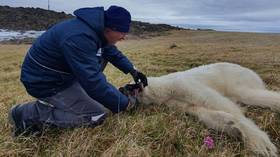Russian scientists save tongue-tied polar bear

Russian authorities flew a team of veterinarians all the way from Moscow to save a polar bear in the remote Arctic settlement of Dikson on Thursday. The female got her tongue stuck in a can of condensed milk and was slowly starving to death. A video of the bear begging for help on the porch of a house in Dikson went viral in Russia this week.
“Half her tongue was stuck in the can,” Alexander Makarkin, the airport employee who recorded the video, told Russian media outlets.
The bear had walked up to the porch of his house and Makarkin tried to remove the can from her mouth, capturing the moment on his cellphone camera.
Suffering polar bear seeks human help pic.twitter.com/nPlpdGT15Y
— RT (@RT_com) July 21, 2022
A team of specialists from the Moscow Zoo made the 2,730-kilometer (1,696-mile) trip to the Russian Arctic. Upon their arrival on Thursday, they quickly tranquilized the bear and gently removed the metal can from her tongue, which was severely injured. The female, whom they named “Monetka” (coin) was then given an infusion to recover her strength, and airlifted away from Dikson by helicopter.
“We spotted the bear about three kilometers from the Dikson airport,” said Svetlana Radionova, head of Russia’s natural resource management agency Rosprirodnadzor, on her Telegram channel. “Our specialists managed to tranq her with their first shot. She was asleep within ten minutes and we successfully removed the can. Now a veterinarian is treating her tongue, which has many cuts.”
The bear turned out to be a female, about two years old, and weighed less than 90 kilograms (198 pounds). She could not eat or drink for days, said Mikhail Alshinetsky, one of the veterinarians who flew into Dikson.
“The tongue is damaged, but will most likely recover because the underlying muscles are not affected,” said Alshinetsky.
Radionova explained that the plan was to keep the bear sedated until her tongue could be patched up, then airlift her away from town and leave her in the wilderness about 60-100 kilometers (37-62 miles) away, with “three sacks of fish” she can eat until she’s well enough to hunt. “We will keep an eye on her, to make sure she’s all right,” she added.
Rosprirodnadzor organized the rescue expedition, headed by the chief veterinarian of the Moscow Zoo, Dmitry Egorov, within a day of Makarkin’s video making the rounds. Unfortunately, bad weather kept them waiting for several hours in Norilsk, the nearest major city.
Dikson is a community of fewer than 600 residents in Krasnoyarsk Region, near where the Yenisei River flows into the Kara Sea. It is the northernmost human settlement on the Asian continent, and was named after Baron Oscar Dickson, a 19th-century Swedish pioneer of Arctic exploration.













